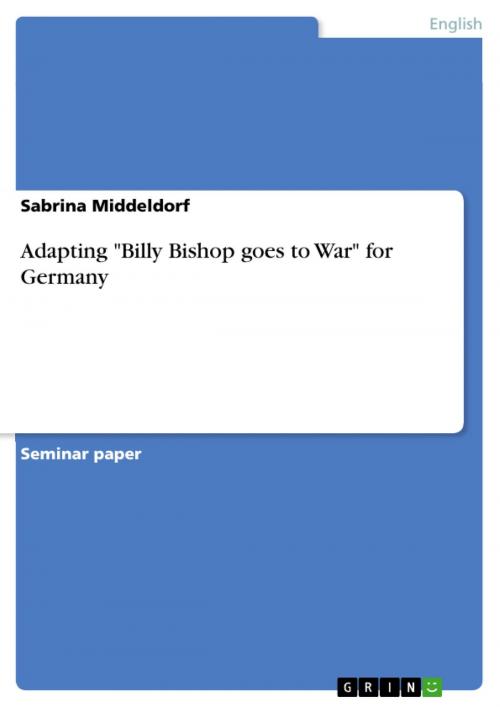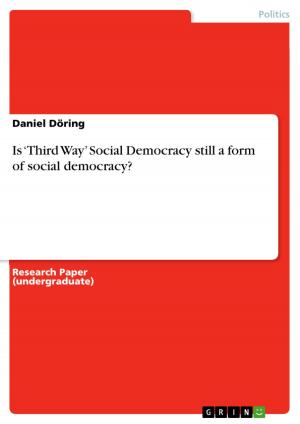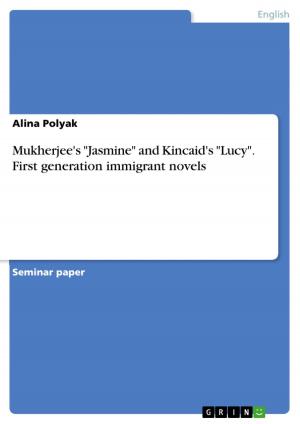Adapting 'Billy Bishop goes to War' for Germany
Fiction & Literature, Literary Theory & Criticism, British| Author: | Sabrina Middeldorf | ISBN: | 9783640617982 |
| Publisher: | GRIN Publishing | Publication: | May 10, 2010 |
| Imprint: | GRIN Publishing | Language: | English |
| Author: | Sabrina Middeldorf |
| ISBN: | 9783640617982 |
| Publisher: | GRIN Publishing |
| Publication: | May 10, 2010 |
| Imprint: | GRIN Publishing |
| Language: | English |
Seminar paper from the year 2007 in the subject English Language and Literature Studies - Literature, grade: 3,0, RWTH Aachen University (Institut für Anglistik und Amerikanistik), course: Recent Canadian Drama, language: English, abstract: I. Introduction - A Canadian play for a German audience While talking about the play 'Billy Bishop goes to war' by John Gray and Eric Peterson that was written in 1976, different points of view play a decisive role. The play deals with a Canadian boy who joins the military because of a lack of possibilities. The action begins in Canada in 1914. That means it is the time of World War I and Canadian forces fight as a part of the Empire against the enemy, namely Germany. The play describes Billy Bishop's rise from a Canadian boy to a national hero as a fighter ace. Consequently there are different attitudes towards the play, for instance if you are an opponent of war or an advocate of it. Furthermore there is the question of age: if you have fought in a war and have seen how friends die or if you are a young man who is full of bravery, strength and patriotism, you have a different attitude towards such a play. But above all there is the question of nationality. As the play is of Canadian origin and originally played for Canadians, the question is meaningless. But on the one hand the fact that the play received great honor and was performed on Broadway and on the other hand the existence of a German film version opens a completely new kind of adapting the play for Germany. In the film version there are German actors that play Billy and the piano player and the text is German, too. What these facts mean and how film and play are adapted for Germany is analyzed in the following term paper. Concerning that there is not any kind of secondary literature about this topic that can be accessed by a German Library, the analysis is based upon my own results of analyzing play and film as well as studying the preface of the drama. The version of the play is the one in the Jerry Wasserman anthology 'Modern Canadian Plays' published by Talonbooks, Vancouver and the film version is the one directed by Peter Meincke and Norman McCandlish of the year 1984/1985. II.1 Summary The Canadian play 'Billy Bishop goes to war' by John Gray and Eric Peterson deals with a young Canadian from Owen Sound, Ontario who becomes a flying-ace and a hero. The play takes place in the year 1914, which means the time of World War I, where recruits from the British colonies were drafted to support the British Empire against the Germans, or as they call it, the Huns. At the age of twenty Billy enters the Royal Military College (R.M.C.) because of a lack of opportunities and the qualification of
Seminar paper from the year 2007 in the subject English Language and Literature Studies - Literature, grade: 3,0, RWTH Aachen University (Institut für Anglistik und Amerikanistik), course: Recent Canadian Drama, language: English, abstract: I. Introduction - A Canadian play for a German audience While talking about the play 'Billy Bishop goes to war' by John Gray and Eric Peterson that was written in 1976, different points of view play a decisive role. The play deals with a Canadian boy who joins the military because of a lack of possibilities. The action begins in Canada in 1914. That means it is the time of World War I and Canadian forces fight as a part of the Empire against the enemy, namely Germany. The play describes Billy Bishop's rise from a Canadian boy to a national hero as a fighter ace. Consequently there are different attitudes towards the play, for instance if you are an opponent of war or an advocate of it. Furthermore there is the question of age: if you have fought in a war and have seen how friends die or if you are a young man who is full of bravery, strength and patriotism, you have a different attitude towards such a play. But above all there is the question of nationality. As the play is of Canadian origin and originally played for Canadians, the question is meaningless. But on the one hand the fact that the play received great honor and was performed on Broadway and on the other hand the existence of a German film version opens a completely new kind of adapting the play for Germany. In the film version there are German actors that play Billy and the piano player and the text is German, too. What these facts mean and how film and play are adapted for Germany is analyzed in the following term paper. Concerning that there is not any kind of secondary literature about this topic that can be accessed by a German Library, the analysis is based upon my own results of analyzing play and film as well as studying the preface of the drama. The version of the play is the one in the Jerry Wasserman anthology 'Modern Canadian Plays' published by Talonbooks, Vancouver and the film version is the one directed by Peter Meincke and Norman McCandlish of the year 1984/1985. II.1 Summary The Canadian play 'Billy Bishop goes to war' by John Gray and Eric Peterson deals with a young Canadian from Owen Sound, Ontario who becomes a flying-ace and a hero. The play takes place in the year 1914, which means the time of World War I, where recruits from the British colonies were drafted to support the British Empire against the Germans, or as they call it, the Huns. At the age of twenty Billy enters the Royal Military College (R.M.C.) because of a lack of opportunities and the qualification of















